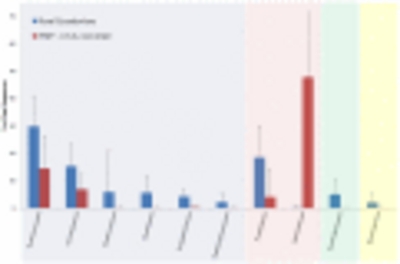Cooper, P; Walker, AW; Reyes, J; Chico, M; Salter, SJ; Vaca, M; Parkhill, J
(2013)
Patent Human Infections with the Whipworm, Trichuris trichiura, Are Not Associated with Alterations in the Faecal Microbiota.
PLOS ONE, 8 (10).
ISSN 1932-6203
https://doi.org/10.1371/journal.pone.0076573
SGUL Authors: Cooper, Philip John
![[img]](https://openaccess.sgul.ac.uk/103192/1.hassmallThumbnailVersion/pone.0076573.pdf)  Preview |
|
["document_typename_application/pdf; charset=binary" not defined]
Published Version
Download (1MB)
| Preview
|
Abstract
Background: The soil-transmitted helminth (STH), Trichuris trichiura colonises the human large intestine where it may
modify inflammatory responses, an effect possibly mediated through alterations in the intestinal microbiota. We
hypothesised that patent T. trichiura infections would be associated with altered faecal microbiota and that anthelmintic treatment would induce a microbiota resembling more closely that observed in uninfected individuals.
Materials and Methods: School children in Ecuador were screened for STH infections and allocated to 3 groups: uninfected, T. trichiura only, and mixed infections with T. trichiura and Ascaris lumbricoides. A sample of uninfected children and those with T. trichiura infections only were given anthelmintic treatment. Bacterial community profiles in faecal samples were studied by 454 pyrosequencing of 16 S rRNA genes.
Results: Microbiota analyses of faeces were done for 97 children: 30 were uninfected, 17 were infected with T. trichiura, and 50 with T. trichiura and A. lumbricoides. Post-treatment samples were analyzed for 14 children initially infected with T. trichiura alone and for 21 uninfected children. Treatment resulted in 100% cure of STH infections. Comparisons of the microbiota at different taxonomic levels showed no statistically significant differences in composition between uninfected
children and those with T. trichiura infections. We observed a decreased proportional abundance of a few bacterial genera from the Clostridia class of Firmicutes and a reduced bacterial diversity among children with mixed infections compared to the other two groups, indicating a possible specific effect of A. lumbricoides infection. Anthelmintic treatment of children with T. trichiura did not alter faecal microbiota composition.
Discussion: Our data indicate that patent human infections with T. trichiura may have no effect on faecal microbiota but that A. lumbricoides colonisation might be associated with a disturbed microbiota. Our results also catalogue the microbiota of rural Ecuadorians and indicate differences with individuals from more urban industrialised societies.
| Item Type: |
Article
|
| Additional Information: |
Copyright: © 2013 Cooper et al. This is an open-access article distributed under the terms of the Creative Commons Attribution License, which permits unrestricted use, distribution, and reproduction in any medium, provided the original author and source are credited. |
| Keywords: |
Science & Technology, Multidisciplinary Sciences, Science & Technology - Other Topics, MULTIDISCIPLINARY SCIENCES, TRANSMITTED HELMINTH INFECTIONS, CAMPYLOBACTER-JEJUNI, GUT MICROBIOME, SUIS THERAPY, DISEASE, SAMPLES, COLON, ASCARIASIS, MICROFLORA, REACTIVITY |
| SGUL Research Institute / Research Centre: |
Academic Structure > Infection and Immunity Research Institute (INII) |
| Journal or Publication Title: |
PLOS ONE |
| ISSN: |
1932-6203 |
| Related URLs: |
|
| PubMed ID: |
24124574 |
| Web of Science ID: |
24124574 |
| Dates: |
| Date |
Event |
| 2013-10-04 |
Published |
|
  |
Download EPMC Full text (PDF)
|
 |
Download EPMC Full text (HTML)
|
 |
Go to PubMed abstract |
| URI: |
https://openaccess.sgul.ac.uk/id/eprint/103192 |
| Publisher's version: |
https://doi.org/10.1371/journal.pone.0076573 |
Statistics
Item downloaded times since 06 Oct 2014.
Actions (login required)
 |
Edit Item |




